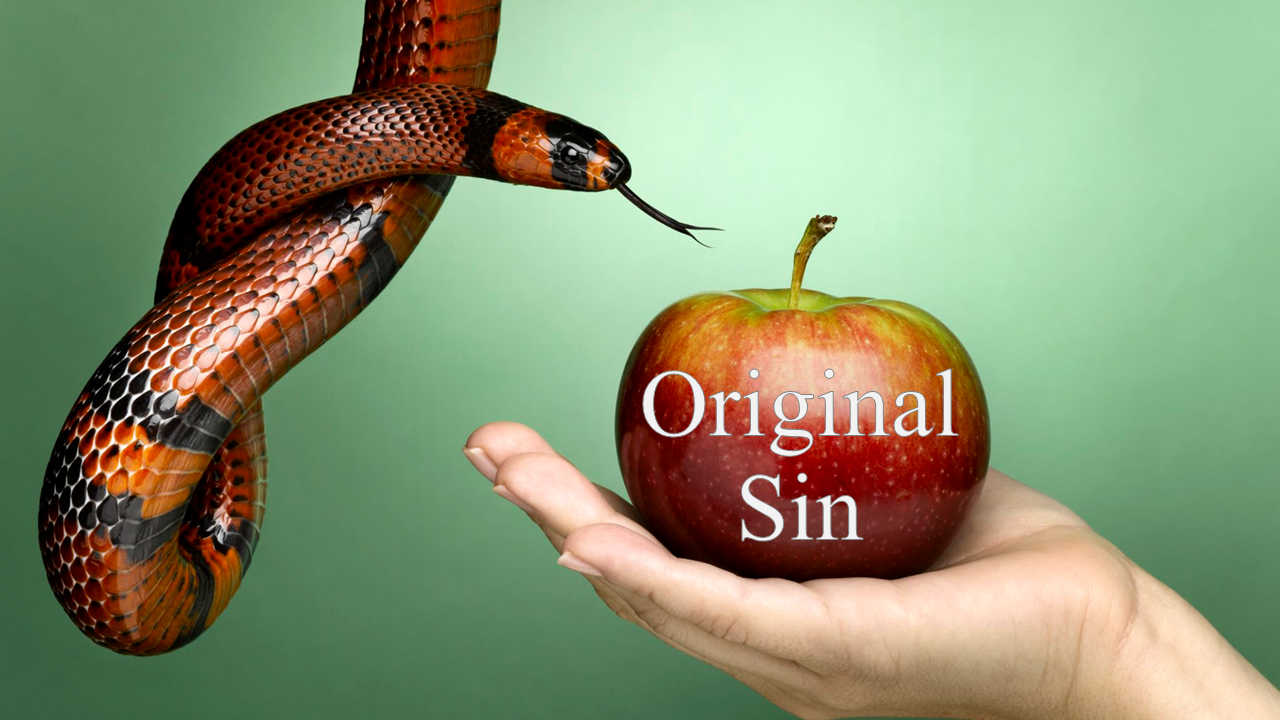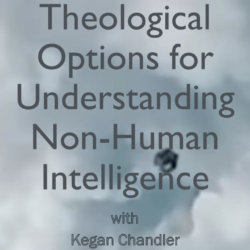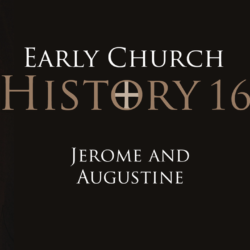In our last episode Kegan Chandler presented his case against the classic doctrine of original sin. Today we are going to hear a critique from Jerry Wierwille of Chandler’s presentation. Wierwille makes the case for a middle position between Augustine and Chandler on the basis of the flow of thought in Romans 5.12-21. He agrees with Augustine that Adam’s sin corrupted human nature so that we are all born with rebelliousness in our hearts. However, he agrees with Chandler that these impulses are resistible, especially with God’s spirit living within us. This is part two of a four part series on Original Sin.
—— Links ——
- Other Restitutio podcasts with Jerry Wierwille
- Check out his website at JerryWierwille.com
- If you’d like to support Restitutio, you can donate here.
- Intro music: Good Vibes by MBB Attribution-ShareAlike 3.0 Unported (CC BY-SA 3.0) Free Download / Stream: Music promoted by Audio Library
—— Notes ——
Romans 5.12
|
Greek |
Διὰ τοῦτο ὥσπερ δι᾽ ἑνὸς ἀνθρώπου ἡ ἁμαρτία εἰς τὸν κόσμον εἰσῆλθεν καὶ διὰ τῆς ἁμαρτίας ὁ θάνατος, καὶ οὕτως εἰς πάντας ἀνθρώπους ὁ θάνατος διῆλθεν, ἐφ᾽ ᾧ πάντες ἥμαρτον· |
|
Latin |
propterea sicut per unum hominem in hunc mundum peccatum intravit et per peccatum mors et ita in omnes homines mors pertransiit in quo omnes peccaverunt |
|
ESV |
Therefore, just as sin came into the world through one man, and death through sin, and so death spread to all men because all sinned– |
Five ways to translate Romans 5.12
- with the result that (Kegan Chandler)
- in whom (Augustine of Hippo)
- by imitating
- because in Adam
- because in themselves
Romans 5.12-21
12 Therefore, just as sin came into the world through one man, and death through sin, and so death spread to all men because all sinned– 13 for sin indeed was in the world before the law was given, but sin is not counted where there is no law. 14 Yet death reigned from Adam to Moses, even over those whose sinning was not like the transgression of Adam, who was a type of the one who was to come. 15 But the free gift is not like the trespass. For if many died through one man’s trespass, much more have the grace of God and the free gift by the grace of that one man Jesus Christ abounded for many. 16 And the free gift is not like the result of that one man’s sin. For the judgment following one trespass brought condemnation, but the free gift following many trespasses brought justification. 17 For if, because of one man’s trespass, death reigned through that one man, much more will those who receive the abundance of grace and the free gift of righteousness reign in life through the one man Jesus Christ. 18 Therefore, as one trespass led to condemnation for all men, so one act of righteousness leads to justification and life for all men. 19 For as by the one man’s disobedience the many were made sinners, so by the one man’s obedience the many will be made righteous. 20 Now the law came in to increase the trespass, but where sin increased, grace abounded all the more, 21 so that, as sin reigned in death, grace also might reign through righteousness leading to eternal life through Jesus Christ our Lord.








Interesting discussion, thanks. I believe that the views of Kegan and Jerry are actually complementary.
A friend of mine gave a following explanation of what happened to humans: “Imagine a married couple that were criminals and got arrested, condemned and deported to Siberia (not Australia, of course 🙂 ). Eventually they have children. Their children are born in captivity and are viewed as “sinners”, even though they had not commit sin. However, since they live under unwholesome circumstances, they would be more inclined to misbehaviour.”
I find this example fitting for our discussion. The terms used by Paul are basically LEGAL terms. “Condemnation”, “reconciliation”, “justification”, “righteousness”. Paul does not speak about biological terms. In this context, all humans are sinners because they are “under condemnation (Siberia)”. In order to be released, they need to be “declared righteous”. And this is where Jesus LEGALLY provides the way out.
Biologically, we die because we are being deported from the Garden of Eden and have no access to the Tree of Life. Adam was mortal without the access to that tree, so are we..
Hence, we are all “SINNERS”. (legally) until someone “bail us out”
Interestingly, being mortal, Jesus was ALSO “born in Siberia” and had to be given “life in himself” in order to redeem others.(John 5:26 New International Version (NIV)
26 For as the Father has life in himself, so he has granted the Son also to have life in himself.) Notice that Jesus did not have “life in himself” before being granted one. The same goes for humans. Compare with this verse: John 6:53 New International Version (NIV)
53 Jesus said to them, “Very truly I tell you, unless you eat the flesh of the Son of Man and drink his blood, you have no life in you.”. Christians, even while still suffering the consequences of the condemnation, can already legally obtain “life in you (themselves)” . Of course, legally. And consequently, biologically, in the world to come.
As for sinning, I believe that Kegan got it right. We can resist sin and should. If we sin, we should ask for forgiveness. God is merciful and will forgive us our sins. However, if we say that “It’s not really our fault”, why bother asking for forgiveness. We could just say “It was Adam’s fault”, right? or “God, you put it in us, it’s your fault”
Seems that several variables are converging in this discussion (Righteousness (God’s & the possibility of Man’s) the lie/deception of personal morality (the knowledge of Good and Evil-and the corruption of the soul’s Fidelity to God due to it) -sin-judgement-the curse-grace-propitiation-faith-The Messiah Yeshua’s Perfect obedience-reconciliation-love), and you will have to bear with me if I come from a few different directions..hopefully it edifies you-I believe Keegan is contradicting the doctrine of “original sin” insomuch that it precludes or by inference prevents “Obedience/Righteousness” as an option for man, which theoretically is a good sound argument, since God’s wrath is promised for disobedience…and God is righteous in his just punishment for sin.. As Igor was alluding above, on the surface it would seem man has a plea to claim incapable of not sinning (Eph 2:3 were by nature are children of wrath)..but only if left on the surface-if we leave out the critical variable of God’s desire for a perfect Love relationship with humanity (people)- then separate out Man’s Obedience or capability for.Righteousness discussion. The communion and the Authority of God as Father is a big deal, Adam is called the Son of God..–So my first question is- How AUTONOMOUS do you believe God made man to be?–Is that a “good” word? If your a humanist-striving for self actualization-you bet it is–but think on our High Priest the PERFECT MAN Yeshua.. the deeper necessity of the original creation as a state of Dependency on God for determining what is Good, and (LOVING IT) and the Deception of the “Goodness” of determining what is Good or evil autonomously, cant be understated here..We have to be careful we arent making a case for or against man’s ability to BE Righteous- APART from communion with God..which happens when we myopically look at this doctrine or that, without looking at the comprehensive whole of the Word of God in the Spirit-God gives the How AND the WHY-and they are inseperable..so the ability to obey God and “Do” what is Good was/is disrupted by the knowledge of Good and Evil which promises Autonomy.(Seperation from God) which is Satans promise- not YHWH God’s-but don’t think God didn’t know it was coming!
Here it would benefit us to discuss the ETERNAL PLAN which God Purposed in Christ–Let me ask you this-why did the perfect sinless Yeshua, depend so heavily on the Sustaining power of Prayer Fellowship with the Father to consistently Love to ONLY DO THE WILL OF HIM WHO SENT HIM? …and Yeshua said “By myself, I can do nothing”..that was Yeshua’s whole ministry, I believe that’s the model of Love/Obedience/Righteousness..period. Considering others greater than yourself.. I believe as He had to, we have to..Matt 16:24-26 Then Jesus told his disciples, “If any want to become my followers, let them deny themselves and take up their cross and follow me. 25 For those who want to save their life will lose it, and those who lose their life for my sake will find it. Rather than get hung up on the idiosyncrasies of a doctrine that says “you cant do what God says you’re supposed to do”, rather lets talk about what Paul means by ROMANS 8 when he says the Carnal mind is at “Enmity against God, for it is not subject to the law of God, neither indeed can be…listen- This is not a discussion about the death of the body so much-thats the wages-any more than the kingdom is just living in a nice place and not dying…This is about the difference between the delusion of Autonomy (which is an offense to God) and Perfect Communion-Love–Let this Mind be in you, that was also in Messiah Yeshua- Who being in the form of God …took upon himself the form of a servant…and became obedient unto death….WHEREFORE GOD HATH HIGHLY EXALTED HIM! Paul is pointing out a Faith/Merit/Reciprocity model here that no Catholic -Calvinist-or Protestant-can rightly divide-but maybe we can talk about that later-The point of emphasis I am trying to make is – 1-The ultimate Plan of Yahweh God in Messiah-which was from before the World began (and I read that Genesis) was to FORGE (not even rescue) the true heart of Humble Dedicated Love (HESED) INTO A PEOPLE FOR HIMSELF-through His Son-AND FOR HIS SON-WOW-And reward him with a kingdom and Give God Glory for it-a plan of a Righteous Father-and the model of a Righteous Son-All the while Fulfilling all His Promises to Abraham, Isaac, Jacob, Joseph, Moses, et, al , and that we Gentiles could be grafted into THEIR Covenant (since we are talking Romans-lets start in 1 and go right on through to 11!! at least) by Faith In OUR Great God who Promises..unto the Purpose of God in Christ- I will leave you with this to ponder-What does Paul mean when he says “Not Discerning the Lord’s Body” in 1 Cor 11:29-Its a simple answer-partaking as one who “Identifies” (by the act) with His Suffering, but is falsely identifying by not dying to himself..eating and drinking damnation onto themselves..remember what Yeshua said, ” Let your Yay be Yay and your Nay be Nay, for all else is of the wicked one”- Without the salient point of “OUR CROSS” / coupled with REPENTANCE from dead works & Created in Christ Jesus unto Good works-we don’t deal with the Carnal mind-which we overcome by Grace and Love-and represent the Kingdom properly- God help us to do it!-
The Answer to the question of how we Can obey is the whole point of the Gospel-but not possible without The Gospel is the point I am trying to make! Hebrews 9:14-then how much more will the blood of Christ himself, who by the eternal spirit offered himself to God as the perfect sacrifice, purify your souls from the deeds of death, that you may serve the living God! (This is not just a behavioralist psych discsussion-this is an apriori one)–Eph 2:1-10 says 1 As for you, you were dead in your transgressions and sins, 2 in which you used to live when you followed the ways of this world and of the ruler of the kingdom of the air, the spirit who is now at work in those who are disobedient. 3 All of us also lived among them at one time, gratifying the cravings of our flesh and following its desires and thoughts. Like the rest, we were by nature deserving of wrath. 4 But because of his great love for us, God, who is rich in mercy, 5 made us alive with Christ even when we were dead in transgressions—it is by grace you have been saved. 6 And God raised us up with Christ and seated us with him in the heavenly realms in Christ Jesus, 7 in order that in the coming ages he might show the incomparable riches of his grace, expressed in his kindness to us in Christ Jesus. 8 For it is by grace you have been saved, through faith—and this is not from yourselves, it is the gift of God— 9 not by works, so that no one can boast. 10 For we are God’s handiwork, created in Christ Jesus to do good works, which God prepared in advance for us to do. Prepared in advance folks-Hebrews 6 is also Foundational -Repentance from Dead works to serve the Living God — May we all come to the knowledge of the Truth, by God’s Spirit, in the Name of Yeshua- God Blesses all who seek Him. As today is the second day of unleavened bread-what did Paul say in 1 Cor 5:8 ?” Let us therefore keep the Feast, not with old leaven, neither with the leaven of malice and wickedness, but with the unleavened bread of sincerity and Truth”. How Deep Is GOD! So that we will all be transformed into the image of His Dear Son-in truth- without a proper doctrine of the One God-none of the mechanics of this works..we must serve one another and pick up our cross-die to ourself -and follow our Master so that he knows us when he comes..Shalom in Yahovah –
This topic has important implications for Christology. Scripture tells us that Jesus was “made like his brothers in every way” (Hebrews 2:17) and “tempted in every way we are, yet without sin” (Hebrews 4:15).
In Western tradition, it is thought that Jesus did not inherit any guilt of original sin nor did he inherit any propensity toward sin (i.e. the fallen nature or what Paul calls “the flesh”) that we inherit from Adam. Rather, as the Second/Last Adam, his incarnation took the form of a man, but not the same flesh descended from Adam. Catholic theology further developed this thinking with the doctrine of the immaculate conception of Mary, which explains how Jesus – although born of a woman descended from Adam – did not inherit original sin from Adam.
But how could any of this be true, in light of Hebrews 2:17 and 4:15? Scripture tells us Christ was made like his brothers in “every” way. Which one of Christ’s brothers had no propensity toward sin? Which one of Christ’s brothers did not have a nature inherited from Adam?
James 1:14 tells us that the source of our temptation is internal, not external: “one is tempted by one’s own desire”. Jesus was tempted (Matthew 4). Could a being with no propensity toward sin and no desire for sin, possibly be tempted? Who knows. But even if such a being could be theoretically be tempted, surely the experience of such a temptation would be very different than the way we experience temptation (i.e. originating from our own desires). If Jesus did not completely share our nature – including our propensity toward sin – how could Hebrews 4:15 say that he was “tempted in every way we are”?
Jerry remarked that he doesn’t understand how an infant could be “saved” (i.e. innocent) and then later become “unsaved”. I would counter that this is very simple and easy to understand. If a person has sinned, that person is guilty of sin. If a person has not sinned, that person is not guilty of sin. A child who has sinned, is guilty of sin. A child who has not yet sinned, is not guilty of sin. There need not be a magical age of accountability at which all children suddenly switch from “saved” (a more accurate word would be “innocent”) to “unsaved” (guilty). It happens when a child sins.
Consider this slightly blasphemous hypothetical: If Jesus has died in the womb, would he be saved? If you answer “yes” but you also affirm that all other infants would not be saved, you are acknowledging that Jesus didn’t share the same nature we have, i.e. he wasn’t human as we are. If you answer “no” you are acknowledging that Jesus was guilty of sin and couldn’t have died for ours.
Obviously, Jesus could not have inherited sin guilt from Adam, or he would merely die for own sin, and not for the sins of the world. Nevertheless, Jesus must have inherited our full humanity including the propensity toward sin that all descendants of Adam experience. Otherwise, he could not have been tempted as we are.
This fact, in and of itself, disproves the doctrine of total depravity and the bondage of the will. If our will is bound to sin and Jesus shared our nature, then his will would have been bound too. But this is obviously not the case, because Jesus never sinned.
In the Eastern Orthodox tradition, which is not under the influence of Augustine and is in many ways more authentic to early Christianity, it is thought that Jesus inherited the same flesh we have – with its same desires – yet he resisted every temptation to sin, thus setting an example for us to follow.
I too think this is closely related to christology, but I haven’t figured it out yet. If Chist had our propensity to sin, or the flesh, then why didn’t that place him under condemnation like the rest of humanity? I do think he was all human like all of us, but it’s a puzzle as well. He had the flesh without condemnation (which doesn’t work) or no flesh and was tempted in all things like us (which doesn’t work) or if there’s no inherent corrupt nature at all, then righteousness by works is potentially possible to all (which doesn’t work). I can see how saying that Jesus is God is a way out, but I have just come to believe he isn’t. I hope Sean will follow this series up with some Christology.
I really respect Chandler’s work but so far I agree with Wierwille. This discussion is clarifying my basic beliefs so has been quite valuable. Looking forward to the next episode.
Be interested to know your thoughts on whether Jesus being flesh, man, a descendant of Adam, also inherited sin. Not just the propensity to sin, but inherited sin itself. But then was a man like us in all things but sin. Does this mean while he did not sin (verb) he had sin (noun)?
Interesting that both Eve and Adam “desired” the fruit of the tree of life, even though sin had not yet entered the world… so desire existed but sin didn’t. For all God made was good at that point. It was taking the apple, the action, that caused the breach wasn’t it, not the desire. So for me there is a difference between a propensity to sin and the action to sin. Is sin nature the propensity to sin, and we have inherited that propensity, which Paul recognizes in himself, the inner struggle between his flesh desires and what he knows (non-flesh or spirit) is right . If flesh of itself has sin “in” it, in it’s state, then would Jesus also have been in this “inherited sin state”? Yet he was a man like us in all things but sin, and he knew not sin. Unless the “out” here, to him inheriting a sin state is that sin is carried by the paternal (father) side and since Jesus did not have a human father….
Flesh has inbuilt desires, a propensity to sin, even from an infant, to want things that perhaps our parents said no to, or that we know would be wrong (e.g. to steal that toy car), but is sin the action. The choice to do it. I do think we inherit a judgement, a condemnation as men and women, based on our link to Adam and I can’t say I understand the justice of inheriting a sentence for something we didn’t personally do. I am working through this and I know God is a just God and there will be an answer. Interested to hear your views on the above too.
Hi, Glen.
Does this help :
1. ‘Sin’ is a transgression of God’s will – in thought, word, or deed. ‘Sin’ entered into the world of Mankind, like a controlling power (cf. ‘Jews and Gentiles alike are all under the power of sin’ – Rom. 3:9, NIV), after Adam’s wilful transgression (Genesis 3:6; Romans 5:12). All men (to a lesser or greater extent) have succumbed to the power of sin (except Jesus) – which is why they all need salvation.
2. Jesus shared our human nature, but Jesus always fully controlled his human desires so that they never led to any sin (in thought, word or deed).
3. Sin is addictive, and a person who commits a sin becomes ‘a slave of sin’ (John 8:34). As Jesus never sinned, He was never ‘a slave of sin’.
4. Within a sinner, human desires that lead to sin can be called ‘sin’, by a figure of speech known as metonymy. Paul in Romans 7:17, 20 thus talks of ‘sin’ figuratively (metonymically) dwelling within him – whereby he means his human desires under the controlling power of sin.
5. Jesus always controlled his human desires in conformity to the will of God (John 8:29), and thus He always successfully resisted the power of Sin (Hebrews 4:15). Therefore, unlike the apostle Paul, it could never be said of Jesus that he had ‘sin’ figuratively (metonymically) dwelling within Him.
6. Uniquely, both Adam and Jesus came into this world as direct ‘Sons of God’ (Luke3:38; 1:32). However, whereas Adam ‘messed up’, Jesus triumphed, and redeems.
Love this discussion, and I’m grateful for Jerry’s insights and depth of knowledge.
I love how Graham Cooke describes our situation: We have a sin nature, not a sin practice. That quote from Tertullian was spot-on. I see it as we inherit not just the condemnation of death but a corrupted copy/file. The DNA like a computer file is imperfect. We tend toward disobedience–our default setting. So we can choose to obey (just as Adam could have chosen to obey) and God’s spirit helps us.
I think John’s first letter really clarifies the whole matter, and I’m surprised none of the speakers used that. John says we don’t sin (sin practice) but if we do sin (due to sin nature), we have a helpful and atonement, Jesus. Some sins are done consciously, others not. Regardless, we have a sin nature that allows us to use our will to obey God and work to curb the “flesh.”